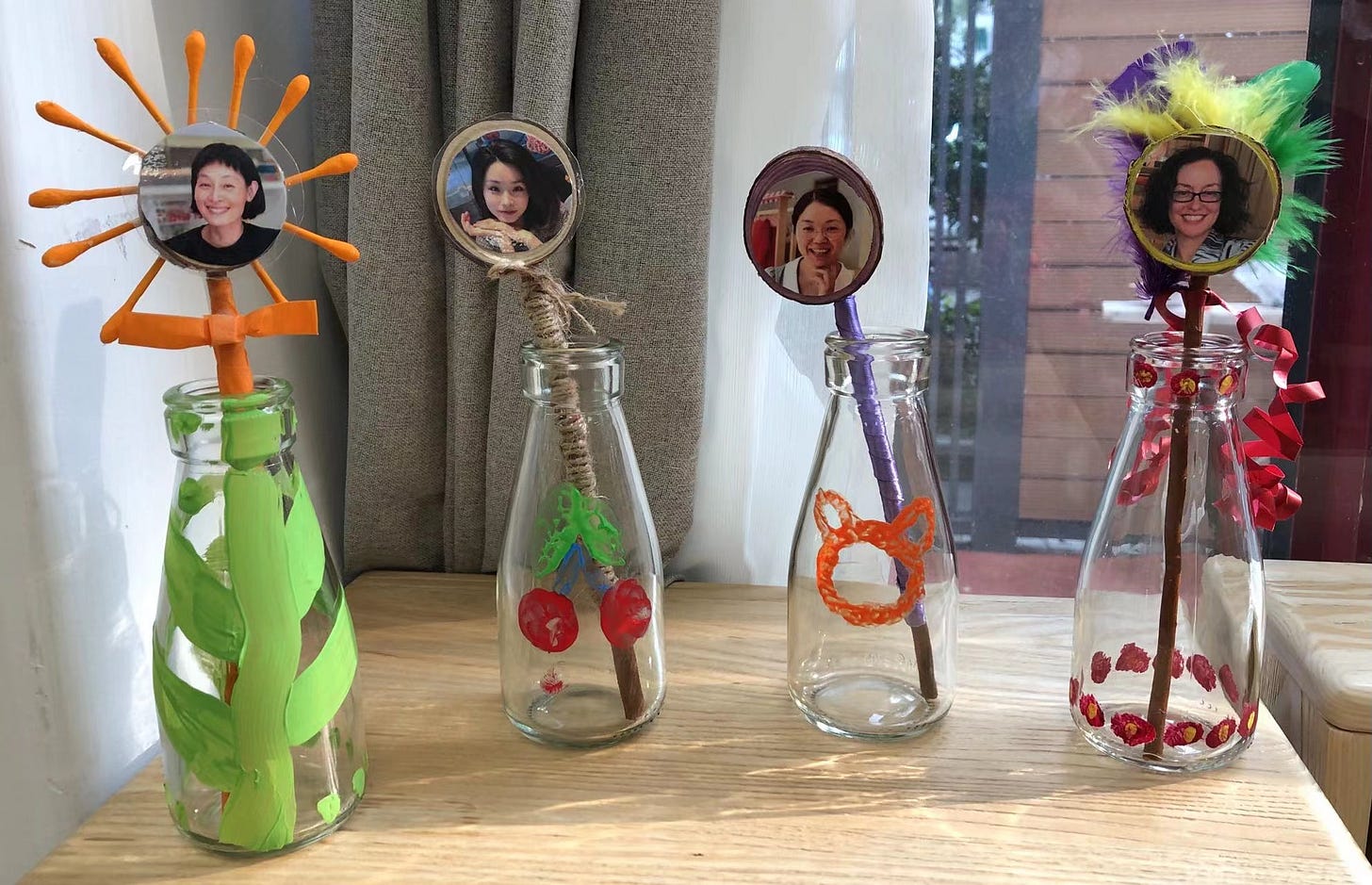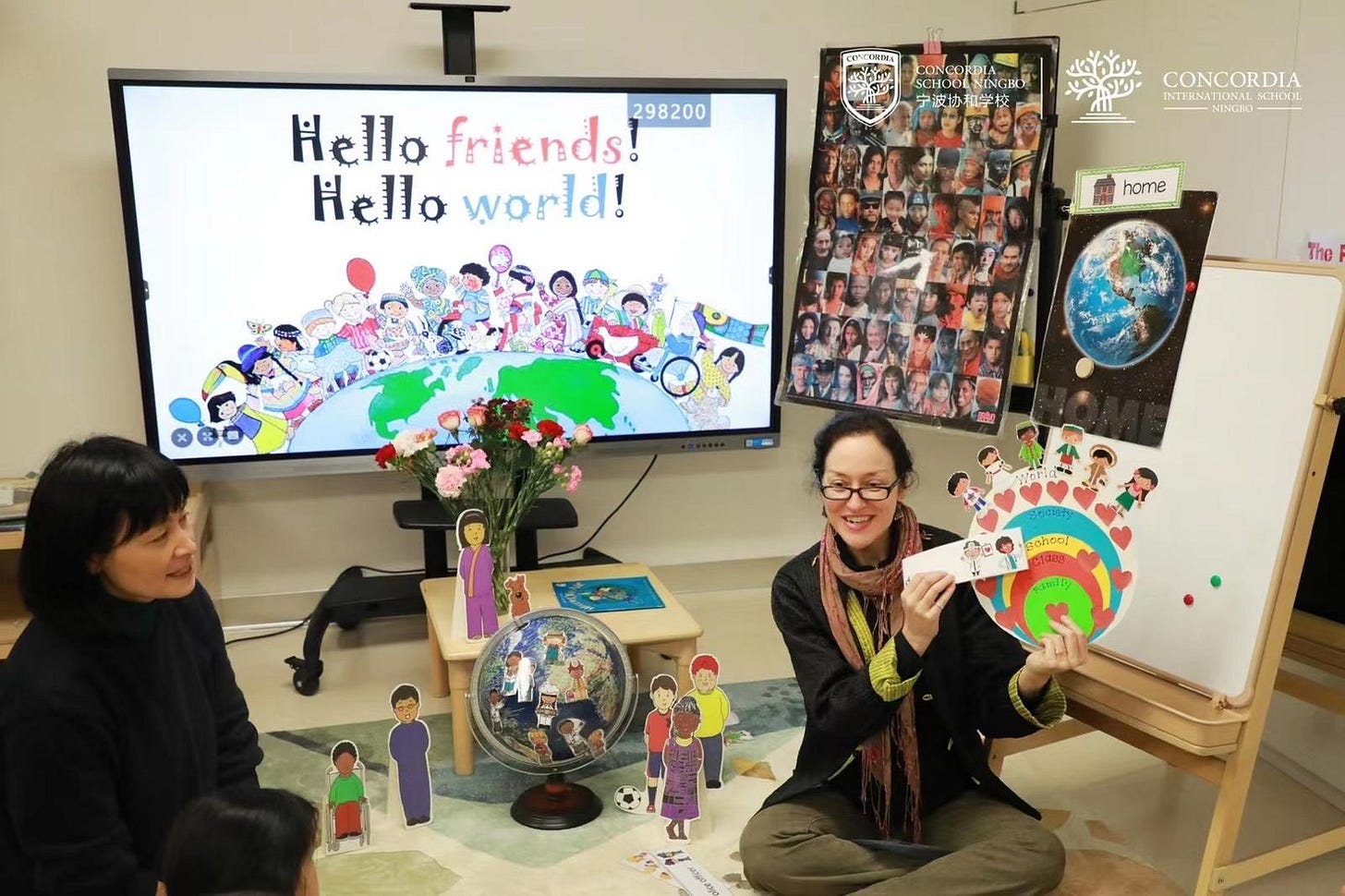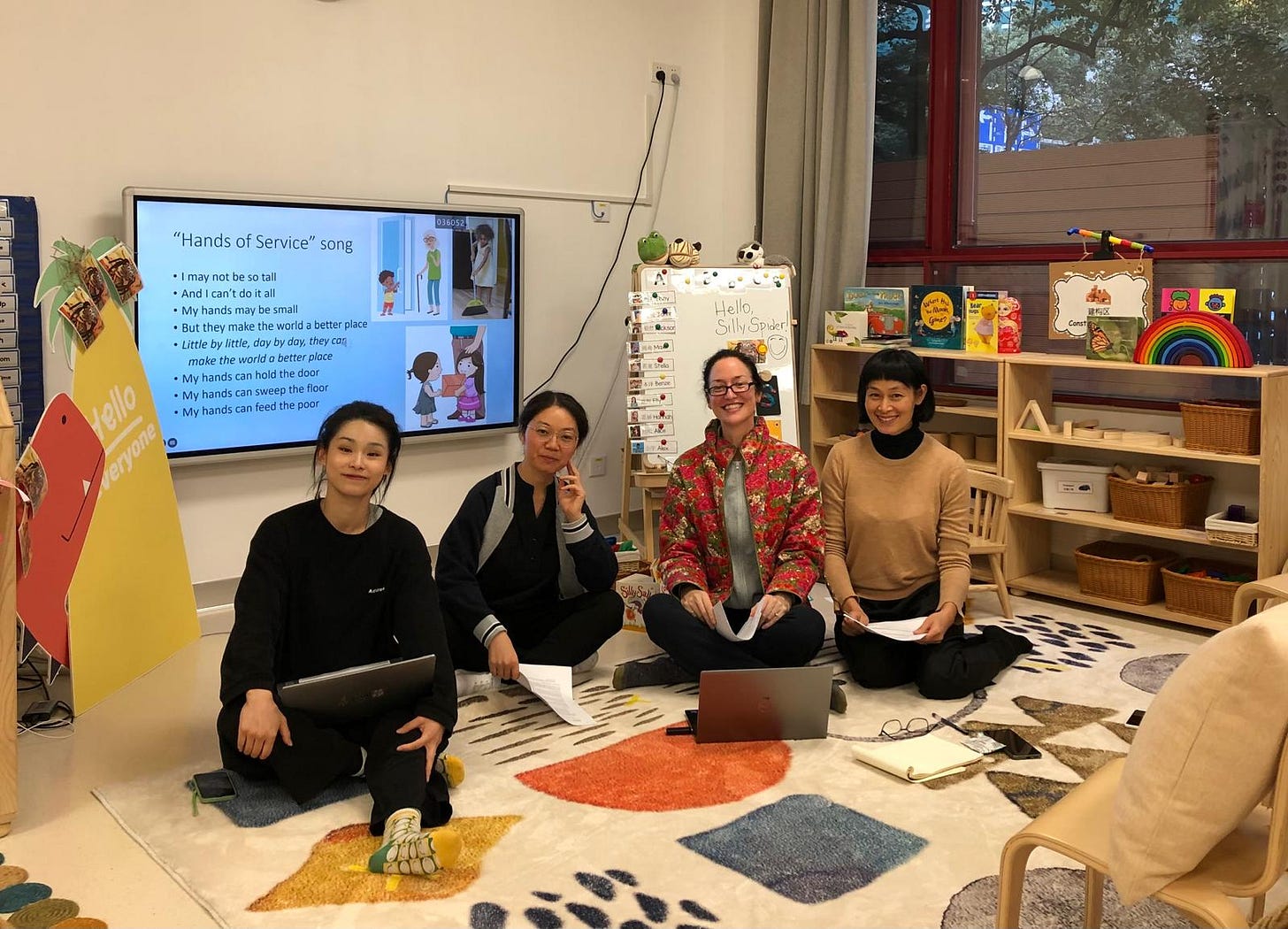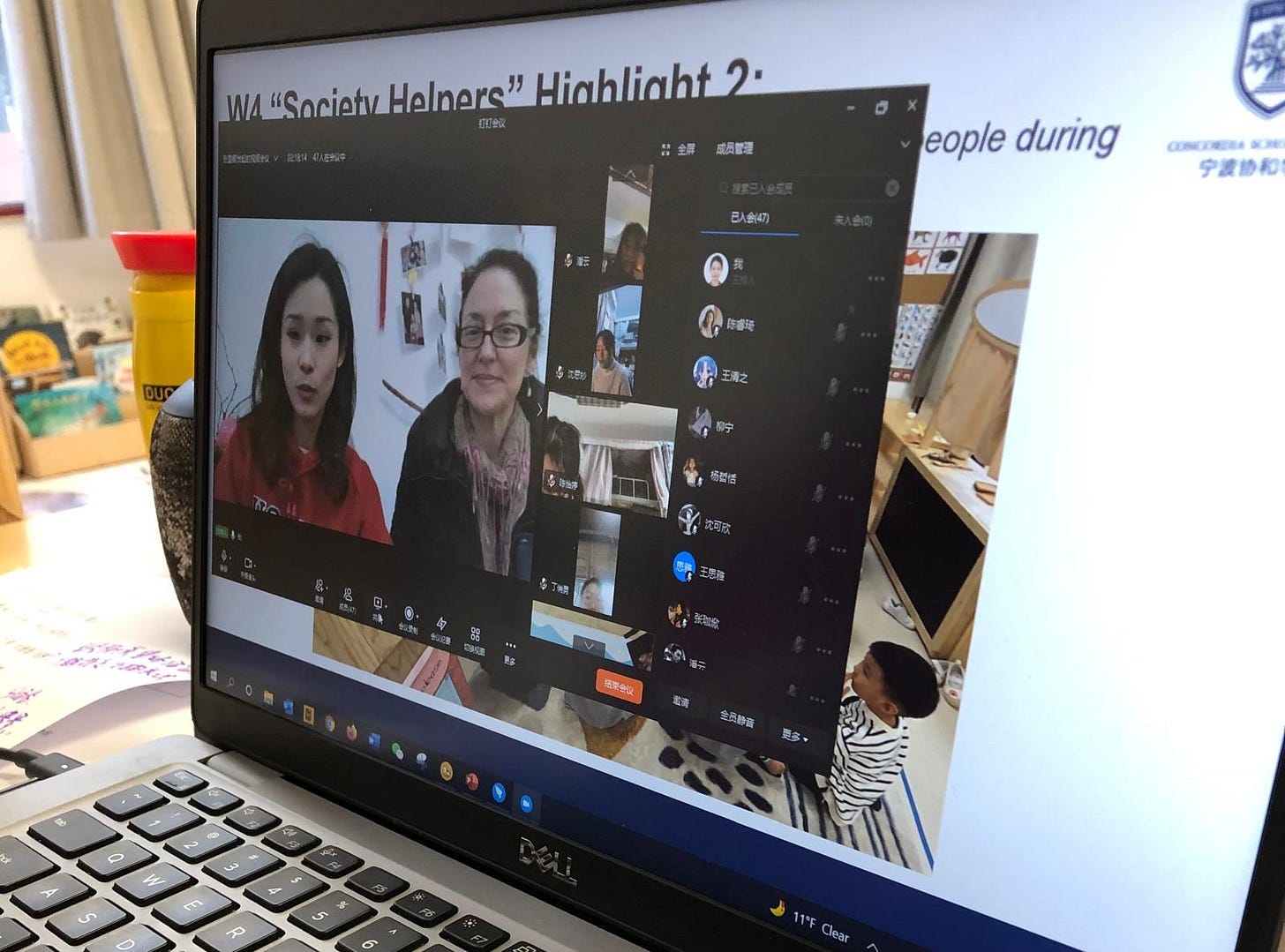A Message in the Meantime
Spirituality, Writing, Background, Deterministic Mental Model, Transformative Leadership & World Citizenship
Two weeks ago, I started an article, “The Missing Link in Life and Society: Spirituality,” and wrote and wrote until I received my first warning from Substack, letting me know the post was too long and suggesting I reconsider its length. I hadn’t realized how long it was until I stepped out of the zone and saw the volume. This time, though, the challenge became clear. The first draft ended up being more academic than I’d like—academic in an old-world way, that is—not personal enough. For a long time, I’ve felt that writing about spirituality and spiritual education in a way that is succinct yet conveys what I truly want to say is no easy task, simply because of the complexity of the subject. I’ve been going through the draft, thinking about how to reshape it. It will take time.
Inspired by youth
The article, by the way—“The Missing Link in Life and Society: Spirituality”—was inspired by an uplifting and privileged experience I had about three weeks ago, supporting and serving alongside youth aged 15 to 22. These capable and caring young people offered a much-needed service to humanity: a free children’s class in a public park where they taught about the universal virtue of truthfulness. I really wanted to write about that experience—that was my whole intention when I began writing. But as time passed, I realized that what I was actually writing about was the deeper foundation of that experience: spirituality and spiritual education. I will get to both of those intended articles! (Thanks for your brilliant hearts, Elena and dear youth!)
So for today, I thought I’d simply share a little of my background again for those who might be interested, along with something I posted on another platform. (Easy to share!)
Writing
One of the created phenomena is the dream. Behold how many secrets are deposited therein, how many wisdoms treasured up, how many worlds concealed. — Baha’u’llalh, The Seven Valleys, p. 72.
Last night, I had a dream. In my dream, I received a phone notification that read: Writing is like water. Then I found myself sweeping a floor, feeling deeply happy as I cleaned. Upon reflecting on the dream (I’ve been studying my dreams for 10 years), I realized that writing is not just an interest—it is my element. Like water, it can cleanse, nourish, and sustain me. And like the simple act of cleaning a floor—a humble, physical task with no ego involved—writing can be the same: a deeply happy, elemental act of releasing, revitalizing, and strengthening, and of preparation, creating space for others and for myself. It, too, can be looked at and done in the spirit of deep joy and service.
So here I am, longing to write, but with nothing quite shaped up as “an article” for today—except for something I shared on another platform, for the Transformative Leadership course, included below: “An Example of Cooperation Leading to More Positive Results Than Competition: Through Education.”
A Bit of Background
When I was a child, around ages 5 or 6, I would play “school” as the teacher and “hospital” as the director. Even then, my path was already pointing toward a life of care, empathy, a love of learning, and holistic health for all. Play in childhood is of critical importance for beginning to explore potentialities.
I have been a teacher—a holistic educator—‘‘in the global systems’’ for 30 years, working mostly with children and junior youth and their parents, and with some experience at the university level with young people—with immense honor and purpose. I hold a Bachelor of Science in elementary/primary education with a focus on language, child, and social-emotional development, and a Master’s in education with a specialization in moral and spiritual education. I have received certifications in Character Development International and Applied Positive Psychology, as well as training and study in other important educational frameworks, including The Virtues Project, Understanding By Design, Project-Based Learning and ECPBL, Montessori and Reggio Emilia approaches, IB Curriculum, and, the outstanding Transformative Leadership—geared for both youth and adult education. My studies have also included courses on racism, Buddhism, Chinese philosophy (see excellent course by Edward Slingerland on The Warring States Period, and highlighting Michael Pruett who explains well the difference between how the self is conceptualized in both Western and Chinese cultures), a new profound principle of consultation, and the creative arts, among other areas. Over time, my educational philosophy has transformed. While my upbringing in the U.S. nurtured a love for exploration and creativity in learning, my professional and cultural immersion in Chinese contexts has deepened my appreciation for structure, discipline, and intellectual rigor—values I now firmly believe and promote as essential complements in a truly holistic approach to education.
In addition to this, I am a member of an informal, dynamic, global group of esteemed Baha’i mental health professionals and academics who strive to apply integrative and forward-thinking approaches to their practices.
My professional path has taken me through public and private schools in the U.S., Taiwan, and mainland China, with the majority of my career immersed in China and Chinese culture. I am now living in the West again, in Australia.
In all of this, I’ve come to see that cultivating true wellbeing, spiritual awakening, and moral leadership—both individually and collectively—requires an approach to education that develops not only the intellect but also the human spirit. A realization that has stayed with me over the years, and is only now beginning to enter public discourse, is this: the missing link in education and society is spirituality—more specifically, spiritual education.
My Substack articles have consistently focused on this approach to education and will gradually evolve into something more sustainable—aimed at greater service to humanity by becoming more valuable and useful in both structure and content.
A Coming Article: The Deterministic Mental Model
Moving from one layer of reflection to another, I had another dream—and was then inspired to write and reflect more deeply on a related subject: mental models.
During last week’s Transformative Leadership session on this topic, I had a vivid, significant dream about deterministic conditioning. It became a transformative moment of learning—not only deepening my understanding of the mental model of determinism but really marking a beginning shift of breaking away from, healing from, and growing beyond its influence. I think this is big. Not only do I feel happy to want to share this dream, but I want to explore the subject more fully. Determinism is one of the core mental models of human nature explored in Transformative Leadership—one we are all encouraged to understand. It might be the focus of my next Substack article.
I'm looking forward to writing more about this mental model and the insights that are beginning to unfold.
Transformative Leadership & World Citizenship
As a closing thought for now, I’d like to share the post I wrote earlier today in our Transformative Leadership course answering the following question: Share an example that you have experienced or witnessed in which cooperation led to more positive results than competition.
Our team’s World Citizenship Community Service IB ECPBL Project, Concordia International Bilingual School, Ningbo, Zhejiang, China, 2022.
An Example of Cooperation Leading to More Positive Results Than Competition: Through Education
Brief notes on educating young human beings and their parents and other adults about world citizenship identity and responsibility.
About our interconnectedness as one human family and the responsibility for all people to care for all people, in one way or another - from our single family to classroom, school, city, and nation families to our global family of nations. How we need to learn to cooperate with one another - and not compete against one another, hurting others' feelings, leaving others out, and creating injustices and unhappiness in the process. How when one succeeds and they help others succeed, how that is true success, how it is not otherwise.
We learned of ourselves as flowers of one garden!
Naturally, a big idea for our little ones, parents, teachers, and other adults. The children—and adults—came to see and understand the concepts and the social skills and virtues required to live as a world citizen through creative games, activities, songs, and service opportunities, and more. (We were even going to meet new little friends from around the globe, but the zoom opportunities were too troublesome to organize for children ages 3.5-4.5 who needed nap time in the day!)
Initial Idea
I initiated the project by first bringing the idea to my team as we began planning for our next project on the theme of ''community service'' (see pic of team, with song lyrics on screen). The ''magic'' appeared in our meaningful conversations and it soon developed into a 6-week World Citizenship Community Service project with systematic opportunities for activities of service for the children to offer/practice at home in their family, in our classroom and school, and in our community.
Note: In our planning meeting, I shared about and showed pictures of a previous experience of organizing a moral service-learning project with my Grade 5 students in another international school in Taiwan using a great portal for the project, Trick or Treat for UNICEF, an outstanding moral education program. We learned about the real plight of children - who they came to see via conceptual learning, their brothers and sisters - from around the world and planned how can we help. The service-learning PBL project was so successful that, the following year, it attracted other teachers and administrators and turned into a schoolwide service-learning project, and then, the next following years, into a three-school service learning project. One year, we, everyone - the children, youth, teachers, parents, and other community members, who all worked together or were the recipient of that work, in the name of raising awareness and funds for UNICEF donated nearly $30,000 to UNICEF. As I understand, decades later, that moral education service-learning project is still ongoing at my previous school. (See one of our UNICEF t-shirts from those years in Taiwan in the video).
Video
In the 2-min video, you will hear our little world citizens singing a song about how they may not be tall and their hands may be small but they can do many meaningful things and make the world a better place—like sweep the floor, hold the door, and feed the poor. Little by little, day by day! (Lyrics, once again, on the screen in the pic). If you really want to have a happy heart, see Alex, who is in the back, far right, at 1:16, find an energy of love and happiness within his little self as he sings it out with all his heart. At the end of the video, see the school principal and a few administrators and teachers join together to promote a firm voice and value of unity/harmony in diversity and how this type of caring, inclusive, moral education is the now and the future, in our English and Chinese message.
Last picture to share is of one of my co-teacher and me sharing about our IB ECPBL World Citizen Community Service project with youth/students at The College of Early Childhood Education in the province of Zhejiang.
Positive Results
How did we witness the positive results or effects of the moral education on human character and society, in our classroom and school, as it relates to cooperation over competition?
To do justice to the full scope of the effects would require a separate article. But in brief: what we observed was a culture of children and adults helping one another in daily life—not out of obligation, but from individual volition and inner motivation. Why? Because true happiness is founded upon spiritual behavior. We witnessed people—young and old—learning how to resolve conflict with care, patience, truthfulness, and love; how to live, work, and play together through consultation, compassion, and the daily practice of virtues and social skills. And much more.
How wondrous it would be to put all this insight into another project for humanity… with a creative group who would combine their strengths. We could together create something powerful, I believe, that would serve the fundamental needs of health and wellbeing, spirituality, and moral leadership so needed today.
With strong, clear-minded, pure-hearted, sincere educators and people, who have become lifelong friends—our team.
‘‘Hands of Service’’, performed by adorable young new world citizens.
Sharing our project experience with students at The College of Early Childhood Education, Ningbo, Zhejiang, China.
Thank you for reading!
What is a message in the meantime for you? Welcome to share, if you’d like. I would be happy to hear from you.
Wishing everyone peacefulness.
For those who are in early childhood education or who have young children and would like to teach your children the song, or who might like to offer free children’s classes for all children on virtues education, much like the brilliant youth who I had the privilege of meeting, welcome to the beautiful song, ‘‘Hands of Service” by Martin Kerr.









What a wonderful, beautiful, message. The Lord is guiding your talents, so happy for you and the many who benefit from your work.
Brilliant!